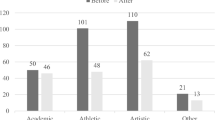Abstract
This study examines how ten young adults in Dalian City, Liaoning Province, China, perceived how their parents helped them with homework during their childhood and adolescence. Between 2011 and 2012, we interviewed five men and five women from Dalian who had first been recruited in 1999 from a college prep high school, a vocational high school, and a junior high school as part of a longitudinal study of Chinese singleton children. In this sample, most parents had not finished high school but expected their children to finish college. Parents’ lack of ability to directly assist their children in their schoolwork at home (and thus promote their children’s skills) was compensated for by involvement strategies that often tapped into their children’s motivation. Our study illustrated how several strategies that have not been reported in the Western scholarship on parental involvement (i.e., reasoning about the importance of education, watching children study, and offering food, criticizing, and blaming) can map onto the skill and motivation development model Western researchers have developed, while highlighting the previously understudied salience of these particular strategies, especially for parents who do not have enough education to teach the skills their children need for upward mobility.
Similar content being viewed by others
References
Baker, D. P., & Stevenson, D. L. (1986). Mothers’ strategies for children’s school achievement: Managing the transition to high school. Sociology of Education, 59, 156–166.
Baumrind, D. (1971). Current patterns of parental authority. Developmental Psychology, 4(1), 1–103.
Baumrind, D. (1991). The influence of parenting style on adolescent competence and substance use. The Journal of Early Adolescence, 11(1), 56–95.
Chao, R. K. (1994). Beyond parental control and authoritarian parenting style: Understanding Chinese parenting through the cultural notion of training. Child Development, 65(4), 1111–1119.
Chao, R. K. (2000). The parenting of immigrant Chinese and European American mothers: Relations between parenting styles, socialization goals, and parental practices. Journal of Applied Developmental Psychology, 21(2), 233–248.
Chao, R. K., Kanatsu, A., Stanoff, N., Padmawidjaja, I., & Aque, C. (2009). Diversities in meaning and practice: The parental involvement of Asian immigrants. In N. E. Hill & R. K. Chao (Eds.), Families, schools, and the adolescent: Connecting research, policy, and practice (pp. 110–125). New York: Teachers College Press.
Chao, R. K., & Tseng, V. (2002). Parenting of Asians. In M. H. Bornstein (Ed.), Handbook of parenting: Social conditions of applied parenting (2nd ed., pp. 59–93). Mahwah, NJ: Erlbaum.
Charmaz, K. (2006). Constructing grounded theory: A practical guide through qualitative analysis. London; Thousand Oaks, CA: Sage Publications.
Chen, X., Hastings, P. D., Rubin, K. H., Chen, H., Cen, G., & Stewart, S. L. (1998). Child-rearing attitudes and behavioral inhibition in Chinese and Canadian toddlers: A cross-cultural study. Developmental Psychology, 34(4), 677–686.
Chi, J., & Rao, N. (2003). Parental beliefs about school learning and children’s educational attainment: Evidence from rural China. Ethos, 31(3), 330–356.
Connors, L. J. & Epstein, J. L. (1995). Parents and school partnerships. In M. H. Bornstein (Ed.), Handbook of parenting (Vol. 4, pp. 437–458). Hillsdale, NJ: Erlbaum.
Corbin, J. M., & Strauss, A. L. (2008). Basics of qualitative research: Techniques and procedures for developing grounded theory (3rd ed.). Los Angeles, CA: Sage Publications, Inc.
Darling, N., & Steinberg, L. (1993). Parenting style as context: An integrative model. Psychological Bulletin, 113(3), 487–496.
Eccles, J. S. (1983). Expectancies, values and academic behaviors. In J. T. Spence (Ed.), Achievement and achievement motives (pp. 75–146). San Francisco: W. H. Freeman.
Ellinger, T. R., & Beckham, G. M. (1997). South Korea. Phi Delta Kappan, 78(8), 624–625.
Epstein, J. L. (1992). School and family partnerships. In M. Aikin (Ed.,) Encyclopedia of educational research (6th ed., pp. 1139–1151). New York: MacMillan.
Epstein, J. L. (2001). School, family, and community partnerships: Preparing educators, and improving schools. Boulder, CO: Westview Press.
Epstein, J. L., & Sanders, M. G. (2002). Family, school, and community partnerships. In M. H. Bornstein (Ed.), Handbook of parenting: Practical issues in parenting (2nd ed., pp. 407–438). Mahwah, NJ: Erlbaum.
Fong, V. L. (2004). Only hope: Coming of age under China's one-child policy. Stanford, CA: Stanford University Press.
Fong, V. L. (2011). Paradise redefined: Transnational Chinese students and the quest for flexible citizenship in the developed world. Stanford, CA: Stanford University Press.
Gonzalez-DeHass, A. R., & Willems, P. P. (2003). Examining the underutilization of parent involvement in the schools. School Community Journal, 13(1), 85–99.
Grolnick, W. S., & Slowiaczek, M. L. (1994). Parents’ involvement in children’s schooling: A multidimensional conceptualization and motivational model. Child Development, 65(1), 237–252.
Gu, W. (2008). New horizons and challenges in China’s public schools for parent involvement. Education, 128(4), 570–578.
Hill, N. E., & Chao, R. K. (2009). Families, schools, and the adolescent: Connecting research, policy, and practice. New York: Teachers College Press.
Hill, N. E., & Tyson, D. F. (2009). Parental involvement in middle school: A meta-analytic assessment of the strategies that promote achievement. Developmental Psychology, 45(3), 740–763.
Hoover-Dempsey, K., Bassler, O. C., & Burrow, R. (1995). Parents’ reported involvement in students’ homework: Strategies and practices. Elementary School Journal, 95, 435–450.
Hoover-Dempsey, K., Battiato, A. C., Walker, J. M. T., Reed, R. P., DeJong, J. M., & Jones, K. P. (2001). Parental involvement in homework. Educational Psychologist, 36(3), 195–209.
Hoover-Dempsey, K., & Sandler, H. M. (1995). Parental involvement in children’s education: Why does it make a difference? Teachers College Record, 97(2), 310–331.
Hoover-Dempsey, K., & Sandler, H. M. (1997). Why do parents become involved in their children’s education? Review of Educational Research, 67(1), 3–42.
Kim, K., & Rohner, R. (2002). Parental warmth, control, and involvement in schooling: Predicting academic achievement among Korean American adolescents. Journal of Cross-Cultural Psychology, 33(2), 127–140.
Kim, S., & Fong, V. L. (2013). Homework help, Achievement in middle school, and later College attainment among Chinese Only-children. Manuscript submitted for publication (copy on file with author).
Kim, S., Fong, V. L., Yoshikawa, H., Way, N., Chen, X., Deng, H., & Lu, Z. (2010). Income, work preferences and gender roles among parents of infants in urban China: A mixed method study from Nanjing. The China Quarterly, 204, 939.
Kipnis, A. B. (2011). Governing educational desire: Culture, politics, and schooling in China. Chicago: University of Chicago Press.
Kong, P. A. (2008). Old man moves a mountain”: Rural parents’ involvement in their children’s schooling. (Unpublished Ed.D.). Harvard University, United States—Massachusetts.
Lareau, A. (1989). Home advantage: Social class and Parental Intervention in Elementary Education. London: New York: Falmer Press.
Leone, C. M., & Richards, M. H. (1989). Classwork and homework in early adolescence: The ecology of achievement. Journal of Youth and Adolescence, 18, 531–548.
Leung, G., Yeung, K., & Wong, D. (2010). Academic stressors and anxiety in children: The role of paternal support. Journal of Child and Family Studies, 19(1), 90–100.
Levin, I., Levy-Shiff, R., Appelbaum-Peled, T., Katz, I., Komar, M., & Meiran, N. (1997). Antecedents and consequences of maternal involvement in children’s homework: A longitudinal analysis. Journal of Applied Developmental Psychology, 18(2), 207–227.
Lin, C. C., & Fu, V. R. (1990). A comparison of child-rearing practices among Chinese, immigrant Chinese, and Caucasian-American parents. Child Development, 61(2), 429.
Maxwell, J. A. (2005). Qualitative research design: An interactive approach (2nd ed.). Thousand Oaks, CA: Sage Publications.
Miller, P. J., Fung, H., & Mintz, J. (1996). Self-construction through narrative practices: A Chinese and American comparison of early socialization. Ethos, 24(2), 237–280.
Nowotny, H. (1981). Women in Public Life in Austria. In C. F. Epstein & Coser, R. L. (Eds.). Access to power: Cross-national studies of women and elites. London: George Allen & Unwin.
Pomerantz, E. M., Moorman, E. A., & Litwack, S. D. (2007). The how, whom, and why of parents’ involvement in children’s academic lives: More is not always better. Review of Educational Research, 77(3), 373–410.
Pomerantz, E. M., Wang, Q., & Ng, F. F. (2005). Mothers’ affect in the homework context: The importance of staying positive. Developmental Psychology, 41(2), 414–427.
Reay, D. (2000). A useful extension of Bourdieu’s conceptual framework: Emotional capital as a way of understanding mothers’ involvement in their children’s education. The Sociological Review, 48(4), 568–585.
Sénéchal, M., & LeFevre, J. (2002). Parental involvement in the development of Children’s reading skill: A five-year longitudinal study. Child Development, 73(2), 445.
Shwalb, D. W., Nakazazva, J., Yamamoto, T., & Hyun, J. (2010). Fathering in Japan, China, and Korea: Changing contexts, images, and roles. In M. E. Lamb & M. E. Lamb (Eds.), The role of the father in child development (5th ed., pp. 341–387). Hoboken, NJ: Wiley.
Tobin, J. J., Hsueh, Y., & Karasawa, M. (2009). Preschool in three cultures revisited: China, Japan, and the United States. Chicago: University of Chicago Press.
Wigfield, A., Eccles, J. S., Schiefele, U., Roeser, R. W., & Davis-Kean, P. (2006). Development of achievement motivation. In N. Eisenberg, W. Damon, R. M. Lerner, N. Eisenberg, W. Damon, & R. M. Lerner (Eds.), Handbook of child psychology: Vol. 3, social, emotional, and personality development (6th ed., pp. 933–1002). Hoboken, NJ: Wiley.
Acknowledgments
We are most deeply indebted to the people in our study for sharing their lives with us. We also thank Hirokazu Yoshikawa, Nancy Hill, Kari-Elle Brown, Stephen Koenig, Yun Zhu, Lisa Hsiao, March Zhengyuan Fan, Emily Bai, Lizzy Austadt, Edward Kim, Dian Yu, and Kunali Gurditta, for their advice and assistance. This material is based upon work supported by the National Science Foundation under Grant No. 0845748. Any opinions, findings, and conclusions or recommendations expressed in this material are those of the author(s) and do not necessarily reflect the views of the National Science Foundation. The research for this article was also supported by a Beinecke Brothers Memorial Fellowship, an Andrew W. Mellon Grant, a National Science Foundation Fellowship, a grant from the Weatherhead Center at Harvard University, a postdoctoral fellowship at the Population Studies Center of the University of Michigan at Ann Arbor, an Andrew W. Mellon Foundation Demography Fund Research Grant, a grant from the Wenner-Gren Foundation for Anthropological Research, a National Academy of Education/Spencer Foundation Postdoctoral Fellowship, a Visiting Fellowship at the Centre for Research in Arts, Social Sciences, and Humanities at Cambridge University, a grant from the Harvard University China Fund, grants from the Harvard University Asia Center, a grant from the Harvard University William F. Milton Fund, and a grant from Amherst College.
Author information
Authors and Affiliations
Corresponding author
Rights and permissions
About this article
Cite this article
Kim, S., Fong, V.L. How parents help children with homework in China: Narratives across the life span. Asia Pacific Educ. Rev. 14, 581–592 (2013). https://doi.org/10.1007/s12564-013-9284-7
Received:
Revised:
Accepted:
Published:
Issue Date:
DOI: https://doi.org/10.1007/s12564-013-9284-7




